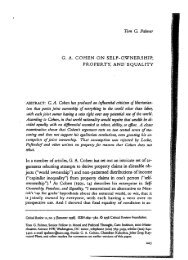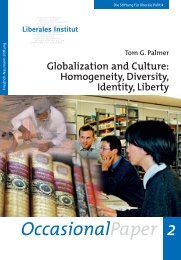Are Patents and Copyrights Morally Justified? - Tom G. Palmer
Are Patents and Copyrights Morally Justified? - Tom G. Palmer
Are Patents and Copyrights Morally Justified? - Tom G. Palmer
You also want an ePaper? Increase the reach of your titles
YUMPU automatically turns print PDFs into web optimized ePapers that Google loves.
852 HarvardJournal of Law & Public Policy [Vol. 13<br />
right to own <strong>and</strong> control tangible objects. Thus, Murray Rothbard<br />
justifies what he incorrectly’ 34 calls “common-law copyright”<br />
as amounting to “the author or publisher selling all<br />
rights to his property except the right to resell it.” t35<br />
Rothbard’s argument implicitly rests on the distinction<br />
drawn by Kant between a “book” (or other object) as a material<br />
thing, <strong>and</strong> a “book” as the work that is instantiated in a material<br />
object but is capable of being instantiated in other such<br />
substrata ad infinitum.’ 36 He extends his argument beyond the<br />
realm of literature to include any artifact that incorporates or<br />
instantiates an ideal object, whether a mousetrap (its design or<br />
the process by which it was made), a map, or a dance step—<br />
which is always materially instantiated in some way, whether in<br />
a performance on some piece of property, or through a description<br />
in a book, film, or other device.<br />
This would extend a copyright-type of protection to the subject<br />
matter of patents as well. Thus, argues Rothbard:<br />
suppose that Brown builds a better mousetrap <strong>and</strong> sells it<br />
widely, but stamps each mousetrap ‘copyright Mr. Brown.’<br />
What he is then doing is selling not the entire property right<br />
in each mousetrap, but the right to do anything with the<br />
mousetrap except to sell it or an identical copy to someone<br />
else. The right to sell the Brown mousetrap is retained in<br />
perpetuity by Brown.‘~<br />
134. See Abrams, The Hi.stonc Foundation ofAmerican Copyright Law: Exploding the Myth<br />
of Common Law Copyright, 29 WAYNE L. REV. 1119 (1983).<br />
155. M. ROTHBARD, THE ETHICS OF LIBERTY 144 (1982) (Rothbard seems to have<br />
made aslip here; he does not mean the right to “resell” the property, but the right to<br />
copy it).<br />
136. See Kant, supra note 88 <strong>and</strong> accompanying text.<br />
137. M. ROTHBARD, supra note 135, at 123. Rothbard seems to have confused what is<br />
beingmade the subject ofa property right. Clearly he cannotmean theright to sell the<br />
object, for then nothing that was copyrighted could be resold, <strong>and</strong> the market system<br />
would either grind to a halt or copyright would become adead letter. He must mean<br />
the right to reproduce, rather than to resell. Note that the argument Rothbard presents<br />
in The Ethiss of Liberty represents a shift from the argument presented in his earlier<br />
treatise on economics, M. ROTHBARD, MAN, ECONOMY, AND STATE: A TREATISE ON Eco-<br />
NOMIC PRINCIPLES 654-55 (1970), in whichhe attacks patents as monopolies, but justilies<br />
copyrights as aform of implicit contractual agreement not to copy. Such an implicit<br />
agreement differs from a right reserved by the creator. “(T]he inventor could mark his<br />
machine copyright, <strong>and</strong> then anyone who buys themachine buys it on the condition that he<br />
will not reproduce <strong>and</strong> sell such a machine for profit. Any violation of this contract<br />
would constitute implicit theft Id. (emphasis original). Rothbard’s more recent<br />
proposal at least avoids themost obvious problem with his earlier position: what right<br />
would the originator haveagainst acopier who did not buy the item, but simply saw it,<br />
heardof it, or found it. There could be no agreement, implicit or explicit, on thepart<br />
ofsuch acopier, <strong>and</strong> henceno obligation to refrainfrom copying. The later“reserved<br />
right” position allows the right to be reserved regardless ofwho comesinto possession












